


































CEO’s comment
Over the coming year, as every year, we will continue at Community Pharmacy England to fight hard for the sector, using every route that we can to secure a sustainable future, while every day remaining in awe of the dedication community pharmacies show to their patients and communities in delivering a fantastic and valued service.
My team and I work exceptionally closely with our Committee, who are representatives of the whole community pharmacy sector and are as varied as the size, scope, and business models you find across it. None of the things we achieve each year would be possible without their hard work and commitment. They are incredibly passionate and articulate – not only about the
opportunities for community pharmacy, but about the realities of the severe challenges you face in this climate.
I would also like to especially thank Sue Killen, our outgoing Chair, who has seen the organisation through significant change and development. Her guidance, commitment and leadership over the past six years has been incredibly valuable to us.
I am pleased to welcome Professor Dame Jenny Harries DBE DL to Community Pharmacy England as she takes on the Chair role. Bringing extensive knowledge and experience, I am looking forward to working closely with her.
Janet Morrison OBE, Chief Executive Officer
Watch Janet’s full comments here:

This past financial year has again been one of change and challenge for community pharmacy. It has also been one of new opportunities, as relationships forged with new Government Ministers at last started to have a positive impact on funding decisions.
Good governance is the foundation of everything Community Pharmacy England does. Core to this is a Committee which both reflects and engages the whole sector. As market changes shifted ownership profiles across the sector we responded to this by appointing two participating observers to the Committee as an interim measure to ensure pharmacy owners with 10 or more NHS pharmacies (non-CCA multiples) have proportionate representation. In parallel with this the Committee – advised by its new People and Governance Subcommittee and with advice from national pharmacy bodiesis considering permanent changes.
Engagement with pharmacy owners and with LPCs has also gone from strength to strength. Committee members have worked hard to keep building strong connections across the country, including through pharmacy owner roadshows held in every region over the summer. We also held a full Committee meeting in Birmingham, and invited LPC representatives to our Committee sessions. Their input has been invaluable.
The annual LPC Conference was a real highlight, attracting one of the highest levels of attendance we have seen, followed by a reception where we had the chance to connect with key opinion formers such as The King’s Fund and Healthwatch England. It has also been a pleasure to Chair the LPC Chairs Forum, and see it continue to develop with Janice Perkins elected as Deputy Chair, and two successful meetings in London
including one at the Houses of Parliament. This was a really valuable chance for LPC Chairs to meet with their local MPs and make community pharmacy’s case directly. This collaboration between Community Pharmacy England and LPCs is vital to ensure community pharmacy has strong, joined-up representation at both national and local level. We are stronger when we speak with one voice.
As I step down from the role of Chair, I want to say a heartfelt thank you to Committee Members, LPC leaders, pharmacy owners, Community Pharmacy England staff, and all those who have supported this organisation during my time here. Representation is never straightforward – it takes resilience, pragmatism, and commitment - but it has been a privilege to see this organisation change the ways that it works, and the impact that it has, and to work alongside so many passionate advocates for community pharmacy.
I am delighted that Professor Dame Jenny Harries DBE DL is joining as the new Chair to take this important work forward. With governance reform plans progressing, engagement getting stronger than ever, a determination to secure a sustainable future, and Professor Harries as Chair, Community Pharmacy England is well placed to face the challenges and opportunities ahead.

Sue Killen, Chair
2024/25 was a breakthrough year for Community Pharmacy England, with the Government committing to a major funding uplift and new arrangements for the sector. This followed months of analytical work and strategic engagement with the new administration, with our negotiating objectives clearly focused on securing urgent investment. While this uplift is a vital first step, we continue to push for long-term sustainability.
Our strategy delivered results beyond funding. We strengthened political influence through regular ministerial meetings, compelling data, and powerful stories from pharmacy owners, achieving 105 national media mentions. Parliamentary events also helped build cross-party consensus on the sector’s value and resulted in 115 Parliamentary questions submitted based on our briefings.
Operational support remained a priority, with 6,600 pharmacy owner and LPC calls and emails responded to across the organisation. We provided training and resources for pharmacy owners and LPCs, producing 300+ CPCF related support materials. We also worked with NHS and IT suppliers to ease workloads, maintained financial assurance processes that saved the sector over £100 million, and secured an additional £165.5 million in reimbursement through our price concession applications.
As the year closed with significant CPCF developments, our focus now shifts to implementation and preparing for the next round of negotiations – critical work ahead of another challenging winter.
We highlight 72% of teams are facing multiple medicines supply issues daily:
Our Pharmacy Pressures Survey 2024: Medicines Supply Report highlights worsening shortages affecting pharmacies and patients nationwide.
April
May
New Pharmacy First materials aimed at GPs launched: Animation and infographic produced to help encourage GPs to refer patients into Pharmacy First.
Our General Election Campaigning begins:
We set out our key priorities for political parties and began engaging with Prospective Parliamentary Candidates to build support for community pharmacy ahead of the election.
Funding & Reimbursement
Shorts launched:
Our Dispensing and Supply Team start a series of video shorts to provide practical advice on funding topics for pharmacy teams.
Labour forms the next UK Government:
After spending over a year building strong relationships with Labour and other parties to secure support for pharmacy from key figures, several supporters were elected - a positive sign for the sector.
Nationwide roadshows held:
Our CEO, Directors and Committee members met pharmacy owners across England to discuss topical issues and present our strategy at regional in-person roadshow events.
geDuringthe neral election
In the lead up to the 2024 General Election:
All major parties mention community pharmacy in their manifestos for the first time.
Community Pharmacy
England and LPCs complete representation changes:
A final update on the Transforming Pharmacy Representation (TAPR) programme confirmed that all workstreams to implement the Review Steering Group’s recommendations – mandated by pharmacy owners – had been completed.
Supported pharmacies through global IT issues impacting NHS systems:
When issues hit the EMIS pharmacy and GP IT systems – as part of a much wider global outage – we provided information to help pharmacy teams manage the situation.
Our Funding and Profitability Report warns that nearly 1 in 6 pharmacies are at risk of closures within a year:
Our second report based on the Pressures Survey 2024 results highlights the fragility of the community pharmacy network.
Pharmacy Minister speaks at our party conference event:
We partnered with think tank Reform to host a panel featuring our CEO, Pharmacy Minister Stephen Kinnock MP, Steve Race MP (Chair of the All-Party Parliamentary Group for Pharmacy), and The King’s Fund CEO Sarah Woolnough.
LPC Chairs Forum convene for the first time:
The forum was set up to ensure local views are heard at national level, steer Community Pharmacy England on local matters, and foster collaboration on areas of mutual interest.
Community Pharmacy England makes submission to Lord Darzi’s review of the NHS:
We highlighted pharmacy’s value and opportunities for the sector in the review commissioned by new Health Secretary Wes Streeting.
Lord Darzi’s NHS review recognises pharmacy’s potential:
Following our submission, the report highlighted major opportunities to expand clinical roles in community pharmacy and expressed growing concern around closures.
Secured changes to planned Pharmacy First threshold increases:
Ministers decided to make changes to the Pharmacy First monthly payment thresholds for the rest of the year, following our representations to DHSC and NHS England.
We highlight that nearly 70 million unfunded consultations happen annually, saving 38 million GP appointments:
The Pharmacy Advice Audit 2024 highlights the scale of unfunded work across the sector.
Parliamentarians back pharmacies in letter to Health Secretary:
In a letter supported by Community Pharmacy England, 20 MPs urge Health Secretary to safeguard pharmacy services.
a webinar to support OPD implementation:
Our in-house experts outlined what the original pack dispensing (OPD) regulatory changes would mean in practice and how pharmacy teams could amend their dispensing processes. Building on that webinar, we also released a series of FAQs.
We submit proposals for NHS 10-Year Plan:
Setting out how pharmacy services can tackle health inequalities, and making the case for investment to help address the sector’s funding gap.
MPs debate pharmacy funding challenges:
20 MPs from all three major parties, briefed by Community Pharmacy England, took part in a parliamentary debate calling for Government investment and long-term support for community pharmacies.
Pharmacy Pressures Survey 2024: Staffing and Morale Report released:
Our third national report highlights that 95% of pharmacy teams feel increased pressure due to staff shortages, and 86% say this has led to longer patient wait times.
Our Autumn Budget analysis highlights major cost impacts for pharmacy:
We outlined immediate concerns and called for mitigations as National Living Wage, National Insurance and business rate increases would take hundreds of millions of pounds out of the community pharmacy sector.
Non-CCA multiple observers appointed to our Committee:
Two observer members join to ensure pharmacy owners with 10 or more pharmacies are better represented.
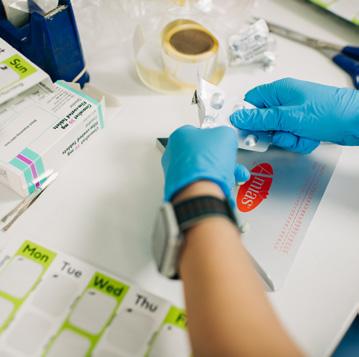
Joint primary care parliamentary event held:
We and other primary care bodies, representing GPs, dentists, and optometrists, hosted a ‘Future of Primary Care’ Parliamentary drop-in event attended by 40 MPs.
Hosted bespoke negotiation training sessions for LPCs:
We hosted negotiating training for representatives from 35 Local Pharmaceutical Committees (LPCs) to help them advocate for sustainable funding in their local work. This built on valuable training previously given to our Committee members and executive team.
Negotiations for 2025/26 funding begin:
Government opens negotiations with Community Pharmacy England on 2024/25 and 2025/26 funding contracts.
Pharmacy First marks first anniversary:
Pharmacy First marked its first year with 2 million consultations delivered and reflections shared in video messages from our CEO, pharmacists and sector advocates.
Secured extension of claim period for four Advanced services:
Pharmacy owners were given an additional 12 months to claim payments for the Hypertension Case-Finding, Contraception, Pharmacy First, and Smoking Cessation Services. This applies when IT issues delay submissions and is something we have long been fighting for.
Independent Economic Review published:
In response to pressure from Community Pharmacy England during contractual framework negotiations, NHS England had commissioned a review on pharmacy funding and service costs.
Major funding uplift of more than £800 million and other arrangements agreed for Community Pharmacy:
Resulting in our sector receiving the largest uplift in funding across the whole of the NHS.

A step-change for the sector, culminating in Government committing to a major funding uplift and other arrangements for community pharmacies for 2024/25 and 2025/26.
Community Pharmacy England secured a funding increase of over £800 million and a total uplift of more than 30% for community pharmacy for 2024/25 and 2025/26. This was the largest uplift in funding across the whole of the NHS.
Critically, Ministers stated that this uplift signals the Government’s commitment to stabilising the sector, and they committed to working towards a sustainable funding and operational model for community pharmacies, recognising their critical role in future healthcare.
The settlement also prioritises:
• Core funding uplift via an increase to the Single Activity Fee (SAF) and enhanced margin provision;
• Key service fee increases;
• Contractual easements, enabling effective delivery and removing bureaucracy.

Settlement breakdown for 2024/25 and 2025/26
baseline CPCF funding and £215 million for Pharmacy First and Primary Care Recovery services
£3.073 billion Service fees increased:
Pharmacy First minor illness consultations fees increase by £2
SAF rises by 19p to £1.46 per item; margin allowance increased to £900 million annually
Historic margin overspend of £193 million written off
New intermediary payment band of £500 for 20-29
Pharmacy First consultations per month
Pharmacy Quality Scheme (PQS) including quality improvements from past schemes set at £30 million, with 75% aspiration payment
Regulatory updates: no clinical audits; maximum of 4 health campaigns; more flexible core hours; NHS prescription signing of paid scripts to be removed; changes for DSPs; NMS subcontracting to stop
NMS fee structure simplified; depression added to eligible conditions from October 2025
‘Bundling’ phased in from June 2025 and legislative changes to expand skill mix use
Emergency contraception integrated into Contraception Service from October 2025
Key commitments: Government recognises the funding gap, has pledged to review Pharmacy First and the margin system, and commits to working towards a sustainable funding and operational model for pharmacy.
£ £
£ £ £
Negotiations happen via a formal process between Community Pharmacy England, Department of Health and Social Care and NHS England. But ahead of this, macro pharmacy funding decisions are made through a complex crossGovernment process which we work to influence at every stage, and throughout the year.
The latest round of negotiations was underpinned by months of analytical and influencing work with the new Government and through its first Spending Review process, as well as being informed by the Independent Economic Analysis. PA Consulting, an independent consultancy with extensive experience working across Government, acted as a critical
friend before and during this period. They supported a review of the Committee’s negotiating strategy and approach, assessed NHS policy priorities and service opportunities, and provided external feedback to our Negotiating Team.
Through the formal negotiations process we were able to shape how the new additional funding would be allocated. Crucially, we also secured measures to try to ensure all Pharmacy First funding would be spent on the sector in 2025/26.
View our negotiating process webpage for more information.
“Ministers have heard our messages loudly and clearly and this is why pharmacy has received a higher uplift than any other part of the NHS, with a commitment of more work to be done to move to sustainability. Ultimately, this settlement gives community pharmacy a foundation upon which to build, with a Government who is listening.”
– Janet Morrison, Chief Executive of Community Pharmacy England (in March 2025)
Our negotiating objectives set out clearly what the sector needs, with the most critical being the funding uplift. The evidence we provided to Government and the NHS covered:
• Financial data, Pressures Survey responses, and analysis of inflationary, cost and activity increases.
• NHS funding levels and parity.
• Detailed analysis of the top 20 pharmacy company accounts showing the huge profitability challenges – their accounts show clear warning signs.
• An independently commissioned economic analysis of the value of current NHS community pharmacy services and the investment case for wider clinical services.
• Cost pressures including:
• National Living Wage increases;
• Ongoing inflation on non-staff costs;
• Increased prescribing levels and demand for other services;
• Pharmacy First delivery and the ‘halo’ effect.
Community Pharmacy England has been clear to Ministers that this is only a first step towards sustainability, and that more funding is needed.
This was the first significant investment in core funding for over a decade, but the Committee accepted the offer reluctantly. Their acceptance came with a serious caveat: although it represents a substantial step change for the sector, it is still not enough to cover the full costs of delivering NHS services, as confirmed by the Independent Economic Analysis. The Government has acknowledged this funding gap and committed to working towards a sustainable model, and it remains our priority to ensure this commitment is met.
Although the funding crisis still needs urgent resolution, our strategy has already delivered key outcomes in investment, clinical services, and political influence.
At Community Pharmacy England’s insistence, NHS England commissioned Frontier Economics and IQVIA to conduct an Economic Analysis of NHS Pharmaceutical Services. Data was gathered from over 10% of pharmacies across England. This significant evidencebased study underpinned our negotiating strategy and quantified the true scale of underfunding in the sector.
Community Pharmacy England was part of the Advisory Board for the project. We played a critical role in ensuring the methodology was right as well as encouraging business owners to contribute data. The analysis showed widespread losses and cashflow pressures, with 47% of pharmacies not profitable at EBITDA level in their last accounting year and a growing number defaulting on pharmaceutical wholesaler’s Direct Debits paying for medicines supplied. It found that the mean Full Economic Cost to operate a pharmacy in 2023/24 was £409–£573k, totalling £5.063 billion for the sector, with nearly 100% of pharmacies receiving less funding than these costs.
We commissioned our own economic analysis through independent economists. Our findings show that closing the funding gap (currently estimated to be £2 billion per year) and commissioning a full range of clinical services could generate over £34 billion in social value annually, with services such as smoking cessation, vaccination, and the New Medicine Service delivering extremely high returns on investment.
View our animation for more details.

We will continue to use these findings to press Government and the NHS to follow good practice in economic regulation, make evidence-based funding decisions, and sustainably fund community pharmacies. Showing the sector’s intense financial pressures has been key to persuading new Ministers to stabilise it.
Community Pharmacy England continues to support the expansion of national pharmacy services. Over the last financial year, we provided a wide range of implementation resources and created promotional materials for pharmacy owners and their teams to use with patients, GP practices and other stakeholders. This was in order to support services such as the Pharmacy Contraception Service, Hypertension Case-Finding Service, and the new Respiratory Syncytial Virus (RSV) and Pertussis vaccination programmes. The RSV and Pertussis vaccinations were introduced as a second National Enhanced Service, initially commissioned in the East of England, with further rollout planned in the Midlands, North West and London. While currently limited to a small number of pharmacies, this marks a strategically important development.
1,552 price concessions granted worth an additional
£165.5 million in reimbursement
£2 million worth of savings from additions to the Discount Not Deducted (DND) list £
£2.26 million saved by securing reimbursement price adjustments for 21 products affected by list price increases
Alongside critical negotiations, work continued on key financial assurance processes which ensure pharmacies are paid correctly and deliver over £100 million worth of savings to the sector per annum.
For example, our Pricing Audit Team (PAT) continued to ensure the accuracy of NHS payments to pharmacies through prescription audits and margin surveys. This work underpins the Funding Team’s activities and makes a real difference for the sector.
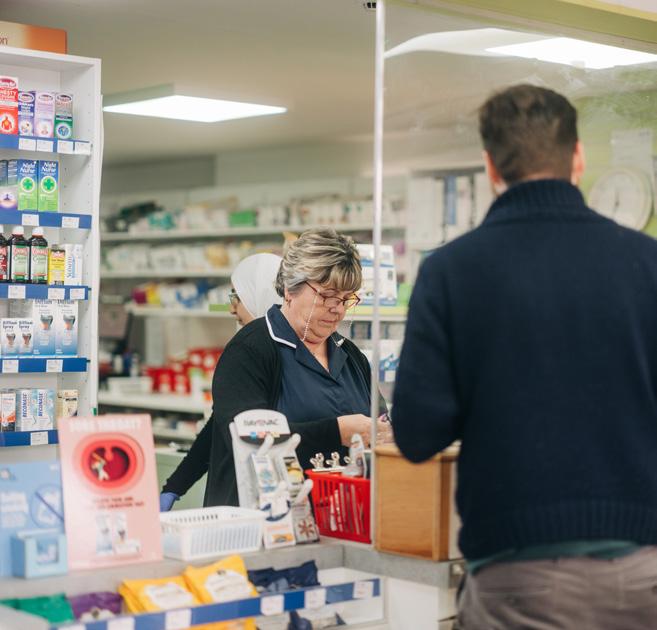

Community Pharmacy England continues to use data effectively to influence policy, and secure media coverage.
This year, we released three reports based on our 2024 Pharmacy Pressures Survey, which gained widespread media attention:
• Medicines Supply Report (May 2024), featured in The Guardian, The Independent , The Sun, and Sky News
• Funding and Profitability Report (August 2024), covered by The Telegraph
• Staffing and Morale Report (October 2024), featured in the Daily Mail
We also partnered with YouGov for public polling to mark the first anniversary of Pharmacy First, which showed that 78% of the public support expanding pharmacy roles to treat more conditions such as chest infections. We issued the press statement for this in collaboration with the National Pharmacy Association, Independent Pharmacy Association and Company Chemists’ Association, and received coverage in The Independent (February 2025).
Polling in October – November 2024 highlighted serious concerns from pharmacy owners and leaders about rising closures and winter pressures, underlining the urgent need for sustainable funding and support. This was widely covered, including by the Daily Mail, Daily Express, BBC News, and GP Online
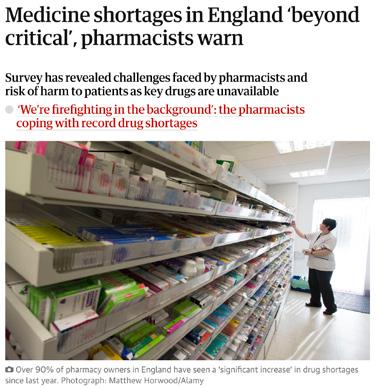
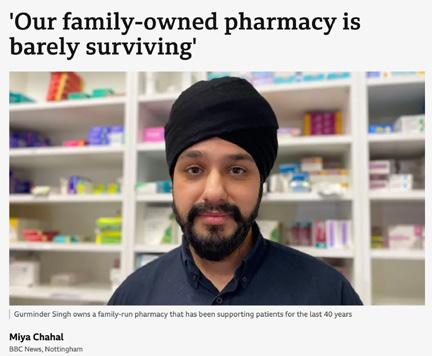
Findings from our surveys were often cited in Parliament and used in MP briefings to reinforce the sector’s value and vulnerability. We also worked closely with Healthwatch England, providing quotes for their reports, including one on public support for Pharmacy First.
We secured 105 national media mentions during 2024/25
Over 260 mentions in Parliament alongside frequent meetings with MPs
In 2024/25, we continued to deepen our relationships across Government, with regular ministerial meetings including Janet Morrison’s engagements with Minister for Care Stephen Kinnock on the CPCF, the NHS 10-Year Plan and the Spending Review. We also engaged Ashley Dalton MP and DHSC Parliamentary Private Secretaries, while our parliamentary champions helped maintain pressure on Government.

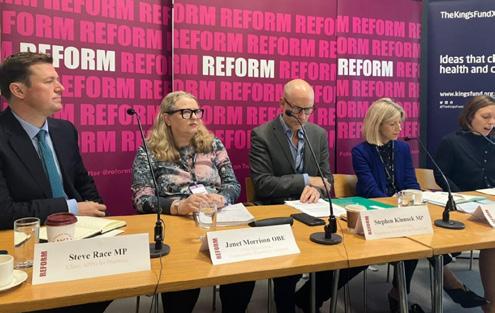
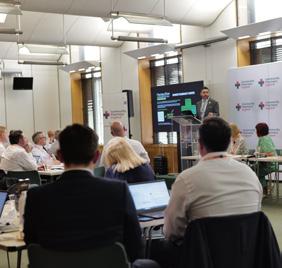
2024/25 has been a crucial year for Community Pharmacy England’s strategy. As well as our strengthened negotiating strategy, work to influence politically was critical following the election of a new Government and ahead of CPCF negotiations. Immediately after the General Election we seized the opportunity to influence the future of community pharmacy, with our public affairs work focused on building strong relationships with Ministers, Parliamentarians, and wider key stakeholders.
This built on the work we had been doing to influence Labour (and all political parties’) policy long before the election, with our approach continuing to be driven by the use of compelling data, powerful stories from pharmacy owners, and a clear vision for the sector’s future.
Our long-term political influencing objectives have been to:
1. Deliver an improved Contractual Framework for community pharmacy
2. Drive the success of the Pharmacy First service, blood pressure and contraception services
3. Promote the role of community pharmacy and the value that it delivers
4. Build the investment case for community pharmacy
5. Lead future thinking about primary care and community pharmacy
We used a range of tactics to work towards these objectives, including:
• Building relationships of influence across Government – engaging with newly-appointed Ministers, special advisers, and Parliamentary champions to ensure community pharmacy remained a political priority.
• Building economic evidence – using data from the 2024 Pharmacy Pressures Survey and Advice Audit, economic work by PA Consulting, and the Independent Economic Review conducted by Frontier Economics and IQVIA, we demonstrated the scale of financial pressures in the sector and the value of investing in pharmacy services.
• Influencing Government policies – we submitted evidence based on our strong economic case to the Government’s Spending Review, as well as to the Darzi Review and NHS 10-Year Health Plan consultation. We also worked with other primary care bodies to highlight the need for wider primary care funding solutions.
The CPCF negotiations took place against a backdrop of rising costs, workforce pressures, and growing demand. We entered negotiations with a clear mandate: to secure immediate investment, protect core funding, and lay the groundwork for a sustainable future. We had polled pharmacy owners about their objectives and used their input to help set our negotiating positions and red lines. And we were supported by a huge amount of financial analysis, pressures data, and economic work, as well as the work and advice of PA Consulting as critical friends during the negotiations.
In 2024/25 we fostered direct links with MPs resulting in:
• Over 155 MP and peers attending our events
• 42 meetings or constituency visits with Parliamentarians
• 115 Parliamentary questions submitted based on our briefings
• 51 signatories to joint letters we facilitated
Our Parliamentary engagement programme expanded significantly. We coordinated pharmacy visits, provided tailored briefings for prospective parliamentary candidates and built strong relationships across all major parties.
This included influential Health and Social Care Select Committee members as well as Shadow Ministers and Opposition Spokespeople, and our regional activity secured support in the South West, with numerous debates on pharmacy issues in Parliament.

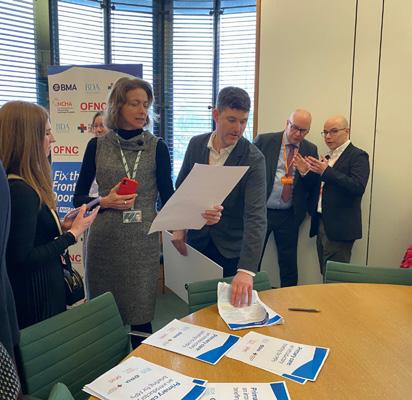



Our key Parliamentary events
• 44 MPs attended a drop-in for new and returning MPs post-General Election;
• Party conference event with Minister Kinnock, alongside wider engagement with the Government’s health team;
• Over 50 MPs attended our March 2025 Parliamentary drop-in focused on constituency data.
These events showcased the sector’s value, particularly in prevention, smoking cessation, and vaccination services, and contributed to building cross-party consensus on the need for long-term investment.
We worked to influence policy throughout the year, including by:
• Inputting to the 10-Year Health Plan: positioning pharmacy around the Government’s three shifts for the NHS.
Presenting solutions: using the Vision for Community Pharmacy, developed with The King’s Fund and Nuffield Trust, to frame policy discussions and demonstrate how a well-funded sector can help Government.
Inputting to Government spending processes: submitted evidence to Spending Reviews, and presenting clear data on the impact of the Autumn Budget and its likely consequences for pharmacy.
We continued to work closely with other primary care bodies to present a united voice on shared challenges. This included:
• Joint submissions to the NHS 10-Year Plan and the Spending Review.
• A co-hosted Parliamentary drop-in in January 2025, attended by 40 MPs.
• Ongoing coordination on joint messaging, events and advocacy.
This collaborative approach strengthened our influence and positioned community pharmacy as a vital part of integrated primary care.
Supporting pharmacy owners and Local Pharmaceutical Committees (LPCs) remained a core part of Community Pharmacy England’s work in 2024/25. This year saw a wide range of support initiatives – from negotiation training for LPCs, to webinars for pharmacy owners on preparing for the introduction of Original Pack Dispensing (OPD) and a range of service implementation materials.
2.7 million visitors to our website
2,100+ attendees at our webinars
35,400 interactions on social media
1,100+ people signed up to our in-person events
6,600 pharmacy owner and LPC calls and emails responded to
300+ CPCF related briefings, news stories, checklists and reminders shared with the sector
160+ newsletters (including news alerts) issued to pharmacy owners and teams
Throughout the year we published regular briefings, guidance and other support for pharmacy owners. This included ongoing support for the implementation of Pharmacy First with a range of promotional materials for pharmacy teams, GP practices and other audiences. Support materials for pharmacy owners and their teams were provided for the Pharmacy Contraception Service, Hypertension Case-Finding Service and the Respiratory Syncytial Virus (RSV) and Pertussis vaccination programmes.
Supporting the network of LPCs remained a crucial area of work, including fostering relationships, providing networking and development opportunities, and providing support to conclude the LPC network transformation.
With our support, the LPC network further consolidated from 54 to 50 local organisations, improving alignment between LPCs and the local NHS, and releasing efficiencies to fund the final £750,000 uplift for national work, as approved in the June 2022 contractor vote on the Review Steering Group (RSG) proposals.
Day-to-day support included news and information, policy interpretation and guidance, and training and development events. We hosted four member sessions to help over 600 LPC members understand and fulfil their local roles.
LPC support was strengthened by recruiting an additional Services Team member to focus on local commissioning, in collaboration with the network of LPCs.
Two bespoke negotiation training sessions were delivered to help LPCs navigate financial pressures and advocate for sustainable funding in their local work. This was part of our work to ensure community pharmacies are sustainably funded, supported and empowered to operate at their maximum potential, as well as recognise the challenges that continue to exist at a time of heightened financial pressure across local NHS systems.
The Annual Conference of LPC Representatives took place in November and for the first time included a stakeholder reception. A new LPC Chairs Forum was created to bring together Chairs (or Vice Chairs) in England; its inaugural meeting was held, and formal Terms of Reference were agreed.

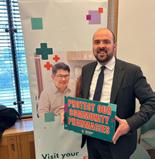

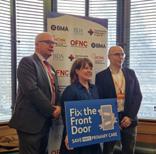
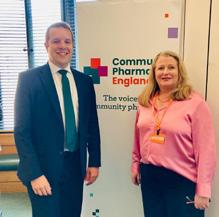

In July 2024, we and LPCs completed the representation changes identified by the Review Steering Group (RSG), as part of the Transforming Pharmacy Representation (TAPR) programme. This milestone included governance reforms and enhancements to our negotiating capacity—critical steps for the future of community pharmacy.
Following the Committee’s decision in January 2024 to consider sector ownership changes and the establishment of the Governance and People Subcommittee in April 2024, two non-voting observer places were added in December 2024 for pharmacy owners with 10 or more pharmacies (non-CCA multiples), while permanent changes are still under consideration.
We continue to provide clear guidance, support and representation on regulatory issues affecting pharmacy teams and over the past year, we shared important information on a wide range of matters impacting the sector.
In relation to Hub and Spoke dispensing, we represented the sector in national discussions, raising concerns about “Model 2” and contributing to the decision that only “Model 1” should be introduced, to better support patient safety and avoid unnecessary regulatory issues.
Regarding puberty blockers regulation changes, we produced guidance on the new restrictions introduced in June 2024, setting out which medicines are affected, the new prescription requirements and restrictions, and how pharmacies should dispense them.
Provider assurance was another key area for our regulations team. We worked with NHS England and NHS Business Services Authority (NHSBSA) to ensure any provider assurance work is undertaken fairly.
Temporary pharmacy suspensions were also addressed as we worked with NHS England to improve the process for notifying temporary closures, helping to minimise disruption to patients.
Pharmacist flexibilities were another key area of focus and during this year, we began discussions with DHSC on expanding pharmacist deployment flexibilities to strengthen workforce resilience and service delivery.
Key negotiation outcomes included more flexible core hours for pharmacists and the closure of the DSP exemption.

Funding and Reimbursement Shorts: The Dispensing and Supply Team launched a new video series in May 2024. Five videos have been released so far, offering pharmacy owners and their teams practical guidance on topics such as Original Pack Dispensing (OPD), ‘FS’ endorsed prescriptions, Serious Shortage Protocols, price concessions, and prescriptions with supplementary product information. Additional video shorts are scheduled for release throughout 2025/26.
OPD implementation: we have been supporting the introduction of OPD, which enables pharmacies to consider dispensing up to 10% more or less than the quantity prescribed in order to supply an original pack, and be reimbursed for doing so.
Collaboration with the Royal Pharmaceutical Society (RPS): we contributed to the RPS Medicines Shortages: Solutions for Empty Shelves report, supporting its recommendations.
Community Pharmacy England works closely with the NHS and IT suppliers to ease pharmacy teams’ workload by improving IT systems and processes.
EPS information in NHS App: Rolled out from early 2024 enabling patients to view prescriptions to reduce queries to pharmacies.
Data Security: Offered guidance during a major global cybersecurity incident, as well as providing the usual support on completing the annual NHS Data Security and Protection Toolkit.
National Pharmacy IT Framework: Lobbied for funding to support pharmacy supplier IT development, with the aim of improving IT capability for pharmacy teams.
GP Connect: Supported the development of GP Connect Update Record and GP Connect Access Record integration with Community Pharmacy IT systems.
NHS Booking & Referral Standard (BaRS): Shared information on new IT standards aimed at streamlining Pharmacy First referrals and supporting pharmacies in managing multiple calendar systems.
Prison Prescriber EPS Interoperability: We supported the expansion of Electronic Prescription Service interoperability with prison prescribers.
NHS IT Support: Connected pharmacy teams and owners with a range of NHS user research teams to improve IT systems based on real needs.
ended 31 March
• Community Pharmacy England’s Financial Statements for 2024/25 were once again audited and prepared by our Chartered Accountants Sawin & Edwards LLP. These figures summarise Community Pharmacy England’s income and expenditure, and financial position.
The increase to the Community Pharmacy England Levy from 2023/24 to 2024/25 represented the final Transforming Pharmacy Representation Programme (TAPR)-driven increase, following the recommendation in the Wright Review on levy funding, accepted by the Review Steering Group.
The majority of this levy increase (c87%) was directed towards achieving the TAPR project and workstreams, and activities that supported Community Pharmacy England to negotiate the funding settlement that was accepted by the Committee in March 2025, and to look forward to future settlements. From 2025/26, continued expenditure relating to TAPR forms part of the “Business as usual” core expenditure.
Community Pharmacy England’s budget for 2024/25 was expected to generate a surplus of c£50k. Owing to timing of the commencement of a number of future-facing, strategic projects and recruitment earmarked for the year, taking place later than expected in 2024/25 and some delayed to 2025/26, the surplus for the year of c£302k is a combined result of timing on costs and some savings on core operational costs.
The 2025/26 budget was approved with a deficit for the year of c£79k. With the 2024/25 delayed costs being spent in 2025/26, the forecast deficit for the year is expected to be higher, averaging the surplus for both years to slightly over c£60k per year.
Community Pharmacy England’s main source of income remained levies from LPCs. The largest item of expenditure was Administration costs. Savings were made in Staff Employment due to timing on recruitment. Additional savings were made on office overheads, Legal and Professional fees and Communication costs, due to an underspend on party conferences following the General Election. The savings in the above areas were offset partly by a higher spend on Travelling and Meeting expenses and Loan Interest.
All levies were collected in full, prior to the year end. The increase in Debtors is primarily due to the increase in Prepayments. Current liabilities increased due to higher Trade Creditors on invoices dated close to year-end and small increase in Accruals.
Balance Sheet as at 31 March 2025
Current liabilities
Creditors: Amounts falling due within one year
Net current assets
Creditors: Amounts falling due after one year
Net assets
General
Year ended 31 March
The 2024/25 financial year ended with significant CPCF news for community pharmacy. Since then, work to implement the changes and to prepare for the next negotiations has continued apace as we head into what will be another critical winter for the sector.
For community pharmacy, the announcement of the Community Pharmacy Contractual Framework (CPCF) arrangements for 2024/25 and 2025/26 in the spring was a major milestone. This was the first CPCF announced under the new Labour Government, and it signalled an end to the trend of ever-decreasing funding in real terms.
But as we knew, the work was only just beginning.
Work to implement the announced changes – from service developments to new funding arrangements – is wide-ranging, and we have been pleased to see many pharmacy owners taking part in webinars and making use of other guidance and resources. We continue to meet with DHSC and NHS England colleagues almost weekly to monitor progress.
And the funding situation as all pharmacy owners know, remains critical. The Independent Economic Analysis which Community Pharmacy England insisted must happen and then worked hard to influence, showed very starkly the breadth of the economic challenges all businesses are facing, and the sheer scale of the remaining funding gap.

The funding uplift, while substantive and welcome, was only a first step towards closing the funding gap, and towards achieving stabilisation of the network and economic sustainability. Pharmacy businesses of all shapes and sizes are continuing to struggle to balance their books and to deliver high quality care under the weight of the ongoing operational challenges. We talked to many pharmacy owners about this directly at our summer regional roadshows.
A survey of pharmacy owners after the announcement of the CPCF arrangements found:
Just 9% of pharmacy owners said the threats to their business would now be manageable.
A fifth (21%) said they will not survive another year.
Over half (56%) said that they are looking at ways to reduce their costs further, which will have an impact on patients.

All of this is very much at the front of the Committee’s minds as Community Pharmacy England prepares for the next round of CPCF negotiations, which we expect to begin sometime in autumn 2025.
The Government has committed to working towards a sustainable funding and operational model for community pharmacy, and our key objective now is to hold them to delivering that promise. Progress needs to be made quickly, if we are to stave off further pharmacy closures and maximise the impact of the new pharmacy services. Pharmacies are doing a fantastic job of this, but they need help urgently.
Dispensed over 1.1. billion prescriptions
Provided over 69 million walk-in consultations
than 5.2 million Pharmacy First consultations
5.6 million New Medicine Service consultations
Since 2015, the sector has delivered 64% in efficiencies –coping with a 45% rise in workload
than 4 million flu vaccinations Over 2.8 million Blood Pressure checks More than 410,000 contraception consultations

As we prepare for these next negotiations, we have once again invested in authoritative economic projects and data analysis to build the strongest possible evidence base that reflects both the realities of pharmacy operations and the value pharmacy teams are consistently delivering. We have also been developing new, compelling policy thinking following the publication of the NHS 10-Year Plan working with think tanks.
We have been planning a programme of Parliamentary events for September and October, as soon as Parliamentarians return from summer recess, to once again underline to Government how much community pharmacy matters, and what you need. And we have been listening carefully to pharmacy owners at our in-person events, and via a further round of sector polling.
Together, we are not only navigating the challenges of today – we are making the case for change and trying to carve out a better future for community pharmacy. We hope to have further progress to report back to you later this financial year.
Visit: cpe.org.uk
Telephone: 0203 1220 810
General enquiries: cpe.org.uk/contact-us
Press/Media Queries: comms.team@cpe.org.uk
Address: Community Pharmacy England, 14 Hosier Lane, London, EC1A 9LQ